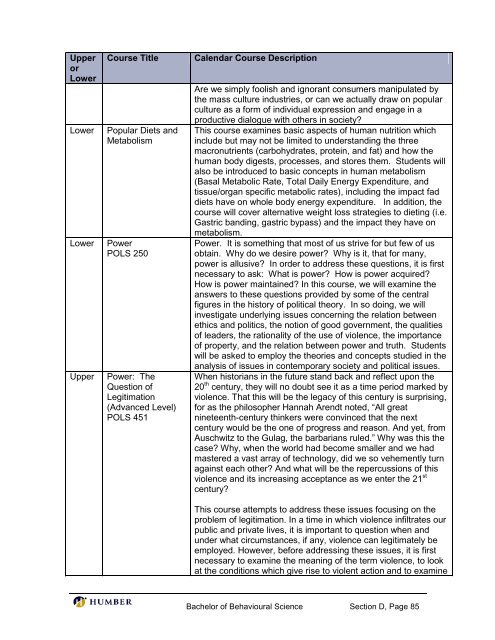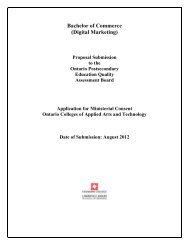Bachelor of Behavioural Science - Postsecondary Education Quality ...
Bachelor of Behavioural Science - Postsecondary Education Quality ...
Bachelor of Behavioural Science - Postsecondary Education Quality ...
Create successful ePaper yourself
Turn your PDF publications into a flip-book with our unique Google optimized e-Paper software.
Upper<br />
or<br />
Lower<br />
Lower<br />
Lower<br />
Upper<br />
Course Title<br />
Popular Diets and<br />
Metabolism<br />
Power<br />
POLS 250<br />
Power: The<br />
Question <strong>of</strong><br />
Legitimation<br />
(Advanced Level)<br />
POLS 451<br />
Calendar Course Description<br />
Are we simply foolish and ignorant consumers manipulated by<br />
the mass culture industries, or can we actually draw on popular<br />
culture as a form <strong>of</strong> individual expression and engage in a<br />
productive dialogue with others in society<br />
This course examines basic aspects <strong>of</strong> human nutrition which<br />
include but may not be limited to understanding the three<br />
macronutrients (carbohydrates, protein, and fat) and how the<br />
human body digests, processes, and stores them. Students will<br />
also be introduced to basic concepts in human metabolism<br />
(Basal Metabolic Rate, Total Daily Energy Expenditure, and<br />
tissue/organ specific metabolic rates), including the impact fad<br />
diets have on whole body energy expenditure. In addition, the<br />
course will cover alternative weight loss strategies to dieting (i.e.<br />
Gastric banding, gastric bypass) and the impact they have on<br />
metabolism.<br />
Power. It is something that most <strong>of</strong> us strive for but few <strong>of</strong> us<br />
obtain. Why do we desire power Why is it, that for many,<br />
power is allusive In order to address these questions, it is first<br />
necessary to ask: What is power How is power acquired<br />
How is power maintained In this course, we will examine the<br />
answers to these questions provided by some <strong>of</strong> the central<br />
figures in the history <strong>of</strong> political theory. In so doing, we will<br />
investigate underlying issues concerning the relation between<br />
ethics and politics, the notion <strong>of</strong> good government, the qualities<br />
<strong>of</strong> leaders, the rationality <strong>of</strong> the use <strong>of</strong> violence, the importance<br />
<strong>of</strong> property, and the relation between power and truth. Students<br />
will be asked to employ the theories and concepts studied in the<br />
analysis <strong>of</strong> issues in contemporary society and political issues.<br />
When historians in the future stand back and reflect upon the<br />
20 th century, they will no doubt see it as a time period marked by<br />
violence. That this will be the legacy <strong>of</strong> this century is surprising,<br />
for as the philosopher Hannah Arendt noted, ―All great<br />
nineteenth-century thinkers were convinced that the next<br />
century would be the one <strong>of</strong> progress and reason. And yet, from<br />
Auschwitz to the Gulag, the barbarians ruled.‖ Why was this the<br />
case Why, when the world had become smaller and we had<br />
mastered a vast array <strong>of</strong> technology, did we so vehemently turn<br />
against each other And what will be the repercussions <strong>of</strong> this<br />
violence and its increasing acceptance as we enter the 21 st<br />
century<br />
This course attempts to address these issues focusing on the<br />
problem <strong>of</strong> legitimation. In a time in which violence infiltrates our<br />
public and private lives, it is important to question when and<br />
under what circumstances, if any, violence can legitimately be<br />
employed. However, before addressing these issues, it is first<br />
necessary to examine the meaning <strong>of</strong> the term violence, to look<br />
at the conditions which give rise to violent action and to examine<br />
<strong>Bachelor</strong> <strong>of</strong> <strong>Behavioural</strong> <strong>Science</strong> Section D, Page 85
















